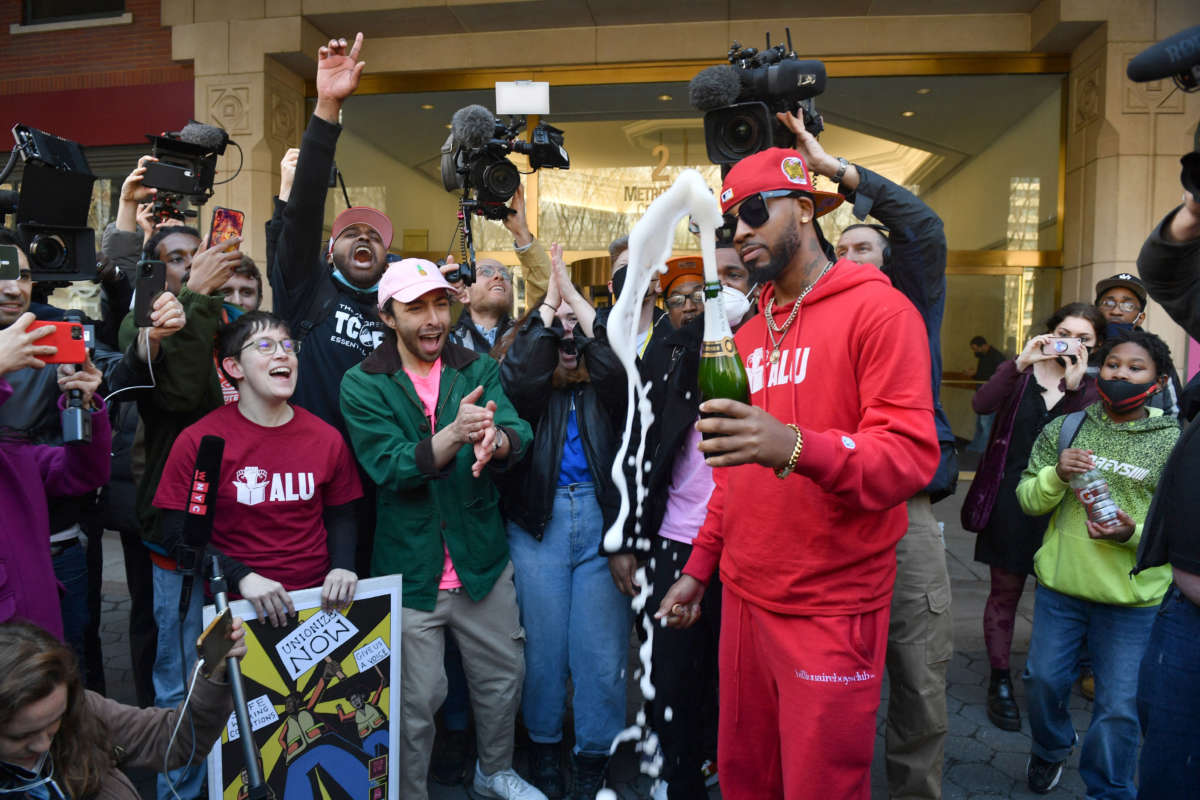Honest, paywall-free news is rare. Please support our boldly independent journalism with a donation of any size.
A federal labor official has rejected Amazon’s bid to overturn a union election in Staten Island, New York, that saw the formation of the first-ever union at the company earlier this year.
This April, workers at the JFK8 warehouse in Staten Island voted to unionize by a margin of 523 votes. The company filed a challenge to the win shortly after — which the company lost on Thursday when NLRB hearing officer Lisa Dunn, who was overseeing Amazon’s challenge, recommended that the objections be “rejected in their entirety,” according to NLRB spokesperson Kayla Blado.
Dunn found that the company did not meet the burden of proof of any of their allegations, and recommended to the board that Amazon Labor Union (ALU) be certified as the bargaining representative for the warehouses over 8,000 employees. The board will issue a formal ruling on Dunn’s decision, and though Amazon plans to appeal the recommendations, the formal decision typically follows a hearing officer’s recommendation.
The union celebrated the decision, and said that it is braced for more fights from the company. “While we are pleased with [Dunn’s] findings, the Amazon workers in the ALU understand that this is just the beginning of a much longer fight,” the union said in a statement. “Amazon’s abuse of the legal process is simply a stalling tactic that is meant to delay our negotiations and cause workers to lose faith in the process.”
Indeed, labor officials had to hold over three weeks of hearings in order to consider Amazon’s 25 objections. The corporation had claimed that union organizers had taken illegal actions during the union campaign and that the National Labor Relations Board (NLRB) had suppressed voter turnout.
Dunn found that Amazon had not established that any of its allegations had affected the outcome of the election or that it was the NLRB’s responsibility to step in on behalf of the company. For instance, the labor board found no merit in Amazon’s allegation that union organizers gave marijuana to workers to buy votes, or that Amazon had trouble communicating its message to workers due to some interruptions to the company’s anti-union meetings.
In fact, it was Amazon who violated federal labor laws during the campaign, the NLRB found in May, as the meetings that Amazon claimed were interrupted were illegal to begin with.The company had taken a slew of actions in their campaign to oppose the union, including threatening to withhold benefits from workers, which the NLRB also found was illegal.
The union’s win this spring was a shock to the labor movement; ALU, an independent union, had faced long odds with a fierce anti-union campaign from the company and with an election on the heels of a failed vote in Bessemer, Alabama, in which workers voted against joining the Retail, Wholesale and Department Store Union (RWDSU).
The NLRB had ordered a rerun for the Bessemer workers last year, saying that Amazon had illegally interfered with the election. The result of the rerun, held in March, is still yet to be determined, hanging on the results of over 400 challenged ballots.
ALU is currently running a union campaign in Albany, New York, where warehouse workers filed a union petition last month seeking representation for its roughly 400 employees.
A terrifying moment. We appeal for your support.
In the last weeks, we have witnessed an authoritarian assault on communities in Minnesota and across the nation.
The need for truthful, grassroots reporting is urgent at this cataclysmic historical moment. Yet, Trump-aligned billionaires and other allies have taken over many legacy media outlets — the culmination of a decades-long campaign to place control of the narrative into the hands of the political right.
We refuse to let Trump’s blatant propaganda machine go unchecked. Untethered to corporate ownership or advertisers, Truthout remains fearless in our reporting and our determination to use journalism as a tool for justice.
But we need your help just to fund our basic expenses. Over 80 percent of Truthout’s funding comes from small individual donations from our community of readers, and over a third of our total budget is supported by recurring monthly donors.
Truthout has launched a fundraiser, and we have a goal to add 182 new monthly donors in the next 24 hours. Whether you can make a small monthly donation or a larger one-time gift, Truthout only works with your support.
